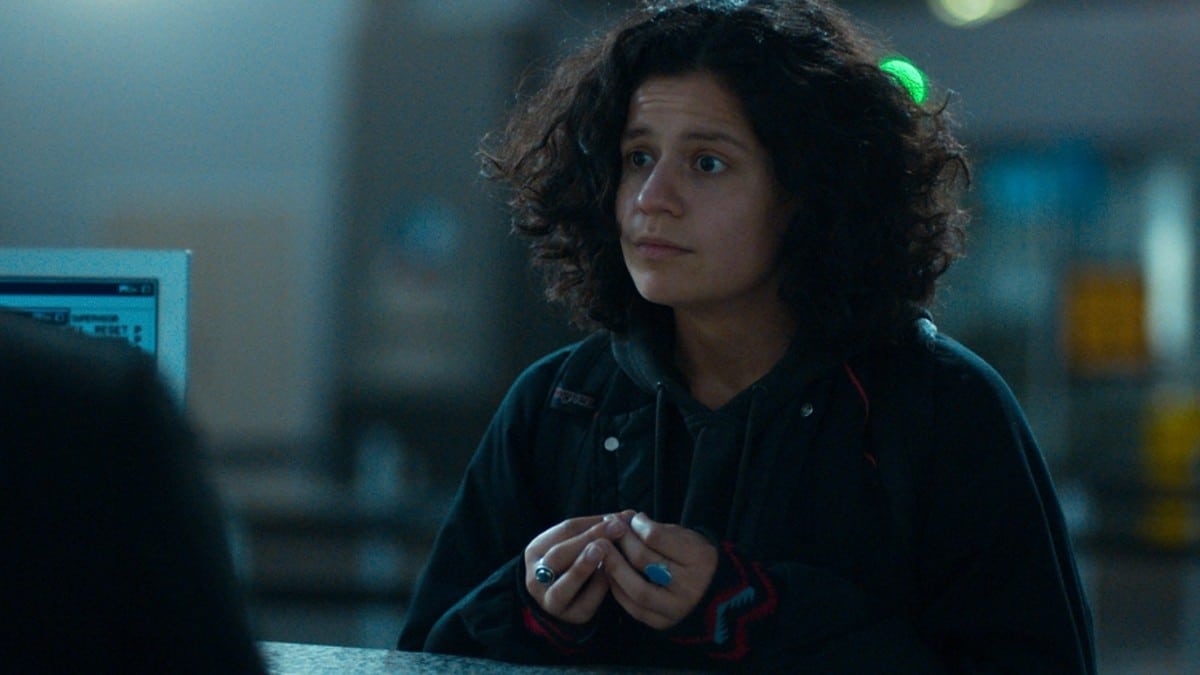
Sandy Lane Productions
MOVIE REVIEW
Millie Lies Low (2022)
She waits until the doors have been sealed before getting up and crying to be allowed off the plane. Then she’s in front of a ticket agent, insisting that she didn’t have a panic attack and pleading to change her unchangeable ticket to the next flight. A new ticket altogether is several thousand dollars, which she doesn’t have. So Millie (Ana Scotney) goes to consider her options. On the airport concourse under which she sits is an advertisement for her university, using her face. With this simple set-up, writer-director Michelle Savill introduces us to Millie’s world (with co-writer Eli Kent), where all the support and love in the world isn’t quite enough to surmount the stresses inside her head.
The plane was supposed to take Millie to New York for a prestigious architecture internship, something that’s unusual for a girl from Wellington, New Zealand, to win. And Wellington is a small town, especially if you’re out of money. Millie’s first, not-so-bright idea is to sneak into her old apartment, where her best friend Carolyn (Jillian Nguyen) is throwing a space-themed costume party, and steal back the keys for the car she’d sold. But even if you have a physical place to hide – Millie chooses an alley near her boyfriend Henry’s (Chris Alosio) apartment, which she also infiltrates in search of ready cash – there’s nowhere to hide on social media. Well, not unless you do a little clever fakery. Buy three bags of chapati flour and that snow angel you’re making to post on Instagram could be in Central Park, right? Tape a poster to the brick wall when you Skype your friends and that brick wall could be in Hell’s Kitchen instead of behind the bins in the alley downstairs, right? For reasons which are revealed much too early in the movie, it’s easier for Millie to pile lie upon lie than fess up and ask for help. Henry and Carolyn could not be better friends to Millie, but Millie’s mother Marlene (Rachel House, underused as ever), who deduces what happened on the plane without being told, is all out of sympathy. And unfortunately in that relationship the movie makes its worst mistake.
Marlene and her late husband were missionaries in the Philippines, where Millie spent most of her childhood as a third-culture kid (as in, someone not raised in their family culture, nor fully integrated into a new society, but in the “third” space in between). This is meant to be the source of Millie’s anxiety, since her lack of acceptance by her peers caused the family to return to New Zealand, where the time in the Philippines meant that she didn’t fit in with the kids at “home,” either. While it is always a pleasure to see third-culture issues in art (it hardly ever happens, especially considering how many of us there are), it’s a pretty simplistic rationale for Millie’s mental health struggles, and also offers no excuse for the other, more pertinent, reason why she ran off that plane. It’s unusual these days to wish a movie contained one fewer idea, but the third-culture subplot needlessly complicates how Millie is failing to rise to a life-changing occasion. It also minimizes the subplot this review isn’t spoiling – anxiety or no, Millie’s choice there was a betrayal and the fact no one, not even Carolyn, sees it as such is incredibly weird.
But without that subplot there is no movie, and the movie as it is – and as was shown at this year’s SXSW Film Festival – stands wholly on Ms. Scotney’s shoulders. She is excellent as someone who can’t help her acts of self-sabotage; she feels the wrongness of her choices and is compelled all the same. She means well; she wants to be good; she loves her friends; and she really wants a career in architecture, and yet. Andrew Stroud’s cinematography, Dan Kircher’s editing, and Ms. Savill’s direction never stop us from seeing Millie clearly, but their main achievement is in the movie’s overall tone. We have here a story about someone having a tough time, when that tough time is entirely and absolutely their own fault, and the story treats that someone only with kindness. Would a movie made anywhere but New Zealand be so understanding? It’s obviously not an American movie, where the humiliations Millie endures as she sneaks around town would be designed for the audience to sneer at her, and it’s obviously not a British one, where the humiliations would be designed for the audience to sneer at themselves. A movie this brimful of compassion is one of the rarest things there is, and that makes it very easy to forgive all its faults. Those faults are few, and do not include the ending, which is unexpected, funny and totally fair to all parties. An imperfect achievement, but a brutally lovely one.
Comments